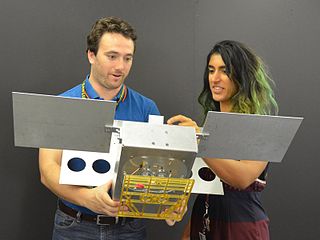Related Research Articles

Engineers, as practitioners of engineering, are professionals who invent, design, analyze, build and test machines, complex systems, structures, gadgets and materials to fulfill functional objectives and requirements while considering the limitations imposed by practicality, regulation, safety and cost. The word engineer is derived from the Latin words ingeniare and ingenium ("cleverness"). The foundational qualifications of a licensed professional engineer typically include a four-year bachelor's degree in an engineering discipline, or in some jurisdictions, a master's degree in an engineering discipline plus four to six years of peer-reviewed professional practice and passage of engineering board examinations.

Food science is the basic science and applied science of food; its scope starts at overlap with agricultural science and nutritional science and leads through the scientific aspects of food safety and food processing, informing the development of food technology.

An engineering technologist is a professional trained in certain aspects of development and implementation of a respective area of technology. An education in engineering technology concentrates more on application and less on theory than does an engineering education. Engineering technologists often assist engineers; but after years of experience, they can also become engineers. Like engineers, areas where engineering technologists can work include product design, fabrication, and testing. Engineering technologists sometimes rise to senior management positions in industry or become entrepreneurs.
A Bachelor of Engineering, Bachelor of Science in Engineering (BSE), or Bachelor of Science and Engineering is an undergraduate academic degree awarded to a college graduate majoring in an engineering discipline at a higher education institution.
Engineering management is the application of engineering methods, tools, and techniques to business management systems. Engineering management is a career that brings together the technological problem-solving ability of engineering and the organizational, administrative, legal and planning abilities of management in order to oversee the operational performance of complex engineering-driven enterprises.

University of Biobío is a university in Chile. It is part of the Chilean Traditional Universities.
Mechanical engineering technology is the application of engineering principles and technological developments for the creation of useful products and production machinery.

Gaziantep University is a public university in Gaziantep, Turkey. Gaziantep University is one of the best universities in Turkey. It has 20 faculties with a strong emphasis on scientific and technological research.
The National Institute for Certification in Engineering Technologies (NICET) is an organization that was established in 1961 to create a recognized certification for engineering technicians and technologists within the United States. A 1981 study by the National Cooperative Highway Research Program (NCHRP), requested by the American Association of State Highway and Transportation Officials' SubCommittee On Construction (AASHTO SCOC), prompted the National Society of Professional Engineers (NSPE) to merge two certification bodies; the Institute for the Certification of Engineering Technicians (ICET) and the Engineering Technologist Certification Institute. The result is a nonprofit organization that provides a nationally recognized and accepted procedure for recognition of qualified engineering technicians and technologists.
The Association of Technology, Management and Applied Engineering (ATMAE) is an association in the United States. ATMAE sets standards for academic program accreditation, personal certification and professional development for educators and industry professionals involved in integrating technology, leadership and design.

An engineering technician is a professional trained in skills and techniques related to a specific branch of technology, with a practical understanding of the relevant engineering concepts. Engineering technicians often assist in projects relating to research and development, or focus on post-development activities like implementation or operation.

Electrical/Electronics engineering technology (EET) is an engineering technology field that implements and applies the principles of electrical engineering. Like electrical engineering, EET deals with the "design, application, installation, manufacturing, operation or maintenance of electrical/electronic(s) systems." However, EET is a specialized discipline that has more focus on application, theory, and applied design, and implementation, while electrical engineering may focus more of a generalized emphasis on theory and conceptual design. Electrical/Electronic engineering technology is the largest branch of engineering technology and includes a diverse range of sub-disciplines, such as applied design, electronics, embedded systems, control systems, instrumentation, telecommunications, and power systems.
Technology management refers to the integrated planning, design, optimization, operation and control of technological products, processes and services, in order to manage of the use of technology for human advantage. It contains a number of management disciplines that allow organizations to manage their technological fundamentals to benefit their customers. The role of the technology management function in an organization is to understand the value of certain technology for the organization and for the customer, and to identify when it is better to invest in technology development and when to withdraw.

Manufacturing engineering or production engineering is a branch of professional engineering that shares many common concepts and ideas with other fields of engineering such as mechanical, chemical, electrical, and industrial engineering. Manufacturing engineering requires the ability to plan the practices of manufacturing; to research and to develop tools, processes, machines, and equipment; and to integrate the facilities and systems for producing quality products with the optimum expenditure of capital.

The Gubkin Russian State University of Oil and Gas is a public university in Moscow, Russia. The university was founded in 1930 and is named after the geologist Ivan Gubkin. The university is colloquially known as Kerosinka, meaning 'kerosene stove'.

Industrial engineering is an engineering profession that is concerned with the optimization of complex processes, systems, or organizations by developing, improving and implementing integrated systems of people, money, knowledge, information and equipment. Industrial engineering is central to manufacturing operations.
Applied engineering prepares graduates to apply mathematics, science, technology, and engineering methods to manage, or support engineering functions. Includes instruction in engineering management, project management, six sigma, production, operations management, systems engineering, auto cad, basic programming, and quality control. The additional application of system design, testing, repairing products, execution of new product designs, and improvement of manufacturing processes.

Rajamangala University of Technology Thanyaburi is a public university in Pathum Thani Province, Thailand. It was established on January 18, 2005, and is a member of the Rajamangala University of Technology system. It offers undergraduate programs in various fields such as engineering, industrial technology, agriculture, business administration, industrial design, architecture, fine arts, science and technology, education, mass communication technology, arts, Thai traditional medicine, and arts-related disciplines. The university aims to produce quality professionals in alignment with the rapidly changing fields of science and technology.
Industrial and production engineering (IPE) is an interdisciplinary engineering discipline that includes manufacturing technology, engineering sciences, management science, and optimization of complex processes, systems, or organizations. It is concerned with the understanding and application of engineering procedures in manufacturing processes and production methods. Industrial engineering dates back all the way to the industrial revolution, initiated in 1700s by Sir Adam Smith, Henry Ford, Eli Whitney, Frank Gilbreth and Lilian Gilbreth, Henry Gantt, F.W. Taylor, etc. After the 1970s, industrial and production engineering developed worldwide and started to widely use automation and robotics. Industrial and production engineering includes three areas: Mechanical engineering, industrial engineering, and management science.
Industrial artificial intelligence, or industrial AI, usually refers to the application of artificial intelligence to industry and business. Unlike general artificial intelligence which is a frontier research discipline to build computerized systems that perform tasks requiring human intelligence, industrial AI is more concerned with the application of such technologies to address industrial pain-points for customer value creation, productivity improvement, cost reduction, site optimization, predictive analysis and insight discovery.
References
- 1 2 3 "Industrial Technology". Education Portal. Retrieved 15 December 2012.
- ↑ U.S. Department of Education Institute of Education Sciences: Classification of Instructional Programs (CIP). Retrieved on October 26, 2009 from http://nces.ed.gov/pubs2002/cip2000/occupationallookup6d.ASP?CIP=15.0612
- ↑ ATMAE Membership Venn Diagram. "Venn Diagram Definitions". Archived from the original on 2013-11-13. Retrieved 2010-10-13.
- ↑ ATMAE Scope of Recognition Archived 2011-12-31 at the Wayback Machine
- ↑ "What Are Some Common Jobs in the Field of Industrial Technology?". utr zfeqaLearn.org. Retrieved 18 October 2015.
- ↑ Abbott, Lewis F. Technological Development in Industry: A Business-Economic Survey and Analysis, ISR Publications, Manchester UK, revised second edition 2003, page 1. ISBN 978-0-906321-29-4.
- ↑ Technological Development In Industry: A Business-Economic Survey and Analysis, op. cit.